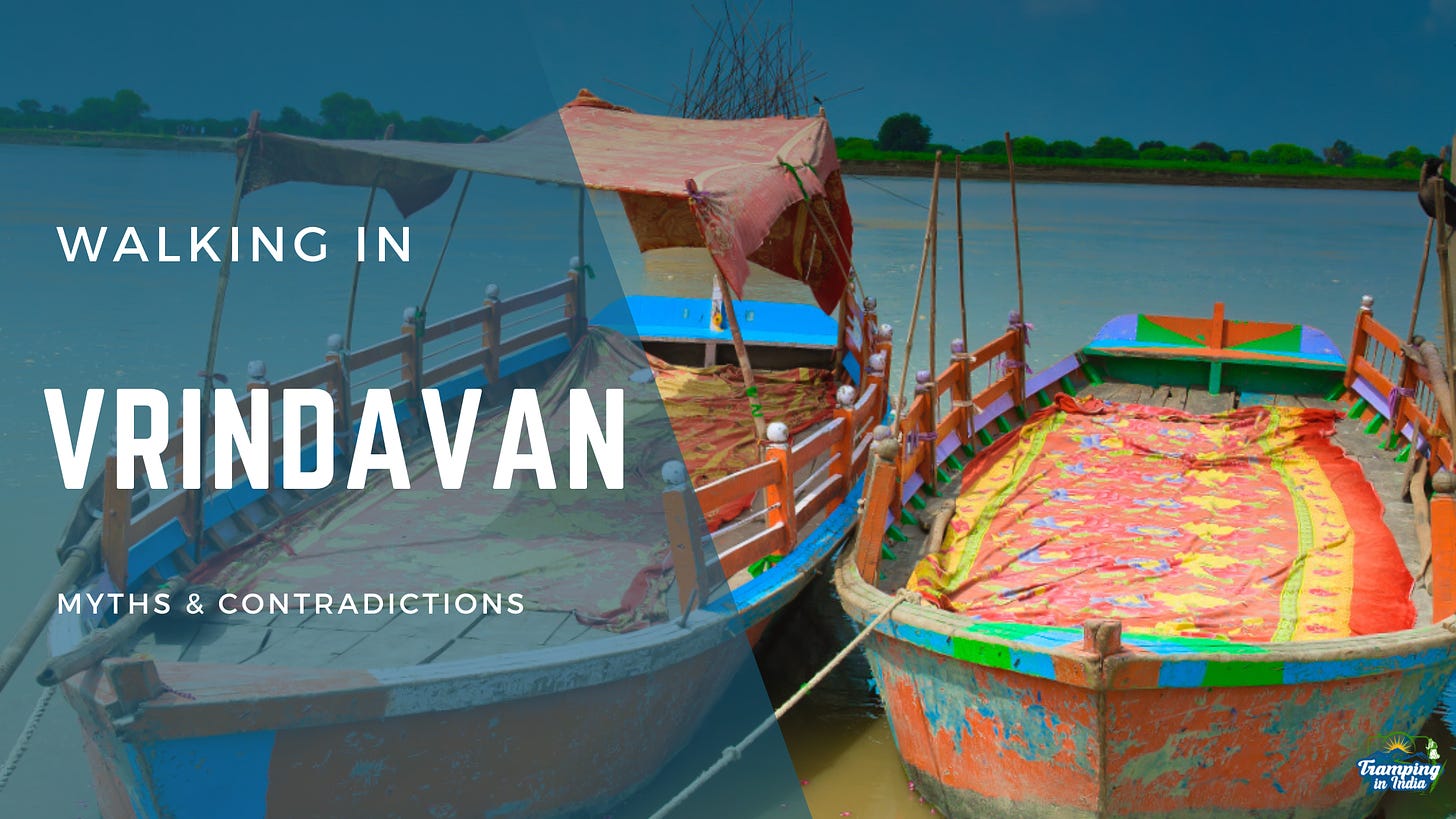Vrindavan is a strange town.
Like most towns, Vrindavan is strange and has its own contradictions. Yet, because of the Yamuna River, its deep links with mythology, its temples, and stories of the enduring romance between Radha and Krishna, it has a unique character.
I did not explore Vrindavan during my days as an upright, uppity, respectable corporate citizen because the business potential was insignificant. If my memory serves me well, I visited Vrindavan a few times during my business career and always wondered why people visit the town. I remember conversing with a local person many years ago. He rubbed his hands gleefully, anticipating the crowds during the annual Janam Ashtami celebrations. Hotel rooms were always scarce, and the scarcity in Mathura and Vrindavan continues. Local people let out rooms at exorbitant prices, many expecting to make a sizeable percentage of their annual income during these days. No one asked for receipts or paid via credit cards or telephone. The tax-free income was always welcome, and the local chap sneered at the thought of paying cash. I didn't inquire if the same practice of renting rooms continues now. However, with the ubiquity of credit cards and mobile payment systems, the blissful days of tax-free income are slipping into the dusty by-lanes of history.
A trip to Vrindavan after many years.
A friend and I drove to Vrindavan a year after I returned to North India, and it was a bright, humid monsoon day. I lost my mobile phone in a swamp en route to Vrindavan after stopping to take some photos of the grass, water, and electrical installations. This photo opens the video as a constant reminder to never put my phone in the back pocket of my jeans. I've ignored the lesson ever since, despite the good Samaritans on the road often reminding me of the risk of someone stealing the phone from my back pocket.
We arrived in Vrindavan to see a car drive into a ditch, and we waited to see if someone would help the hapless driver. People helped get the car out, and a mix of good intentions and selfishness (the vehicle was blocking the traffic) motivated them to move their behinds to help. I must constantly remind myself not to judge people based solely on their appearance. When I saw a pair of monks riding a tractor by us, they looked more like thugs than saints. The monks (or sannyasis, as we call them) resembled thugs, but their lives are uncomfortable, and their sunburned faces often led us to judge them and frequently condemn them. We worship the real thugs, businesspeople with gleaming, polished teeth, cultured tones, wearing bespoke clothes, and wandering in the bloody corridors of power and corruption.
A guide caught us and walked us around the town, taking us to a burned-out garden where, he said, Krishna's gopis often wasted away in love. In simple terms, a 'gopi' was a cow-herding woman and has become synonymous with their love for Krishna. "On a moonlit night," he said, "you can listen to them sing from the garden's hedges." My skeptical nature kicked in, and I said, "Right, sure!" While walking to a temple, I heard women chanting hymns inside a building. "Widows," he said. That was the first time I learned of the widows of Vrindavan, but on that day, I ignored his words.
He rushed us into a temple and asked a priest to perform a ceremony for the two of us. I ought to have realized something fishy was taking place when he folded his hands and said he didn't need payment for his guide work: the ceremony was enough for him. The priest chanted; we gave him some money, then he asked us if we wished to feed many cows to save the souls of our ancient ancestors, and then we ran. Instead, my friend got up, caught me by the scruff of my collar, yanked me up, and yanked me out of the temple. Back in the blinding light, we decided we'd had enough of Vrindavan for the day and returned to Delhi.
On a subsequent trip, I noticed an old woman sitting in a gully, looking as though her world had collapsed and continued to worsen. At the far end of the gully, a well-fed cow sat, eating the food that someone from an open doorway threw in its direction. Meanwhile, the emaciated old woman prayed for alms and prayed to God for deliverance.
Temples. And photographing god.
There are over 5,000 temples in Vrindavan, and several people I know visit the town every month to pray at temples and make donations to temples. The Hare Krishna Mission Temple has a television screen outside its gates, screening the obese Indian and Western priests chanting while the faithful line up outside.
The priests are protective of their temples, and, on one visit (with a different friend), I stood sipping chai while my buddy photographed a street temple. As he turned to go, the skinny old priest scampered after him, abusing him and screaming that it is forbidden to photograph 'God.' Silence and discretion are the best when people scream about religion and politics. Logic fails, tempers rise, and discretion insists you walk away from the fray, even if someone calls you a bloody coward. I remember doing that when I was inside the Banke Bihari Temple to photograph Holi a few years later, and the priest spewed venom in the filthiest language I have ever heard.
Priests are humans, too.
Religion and religious tourism are the backbones of the town's economy, and I could not find any significant activity outside 'the Radha Krishna economy.' I may be missing something important, but who knows? The restaurants are terrible: we make vegetarianism a fetish, with people like Sudha Murthy (the wife of Narayana Murthy, the founder of Infosys) simpering in hypocritical glee and telling us how she carries her vessels on international trips because she cannot risk anyone diluting her faith. I don't mind eating vegetarian food but dislike restaurant owners' disdain for preparing tasty or hygienic food. A captive audience must not blind you to the need for excellent customer service, nor should it dilute your professional pride.
The violent streak hides beneath the surface.
Vrindavan is the town of Radha, and the customary greeting here is "Radhe Radhe,' not "Namaste." Violence lies just below the surface, and I got a taste of the murderous streak on one of my visits. Vrindavan is in the northern Indian state of Uttar Pradesh. My friend grew up in another town in Uttar Pradesh and adopts a gruff manner when he speaks with people. He peppers his sentences with "BC" or "MC." "BC" and "MC" are the English initials for Hindi words, with "BC" referring to a person who has sex with his sister and "MC" referring to a person who has sex with his mother.
Many people in North India use these words in everyday speech, but only among close friends. We don't address strangers as "BC" and "MC." We hired a rickshaw for the day, and the excellent man dropped us off at our hotel for lunch. When my friend walked in, the rickshaw driver caught me by the shoulder and said, "Tell your fat friend to watch out. We don't like people to address us with such language, and while we address each other with 'Radhe Radhe,' we will not hesitate to cut your throat with a knife."
I clapped him on the shoulder and assured him of my undying friendship, and he told me not to worry because he considered me polite.
Don't worry! Ya, right, I thought to myself, not enjoying the image of my fat friend with a slit throat, lying at my feet and me wondering what to do with the police and how to communicate the potential murder to his wife and mine. We left Vrindavan unscathed, uncut, and with blood and organs intact, and I credit myself for drumming (temporary) sense into my chubby buddy.
Vrindavan’s widows. Our patriarchal attitude.
There are about 15,000 to 20,000 widows in Vrindavan, most of them old, waiting for death. I asked people about them, discovering that their families abandoned them after their husbands died. Local goons often force the young widows into prostitution, and later, most of them beg, pray, and wait for death. If you read the articles I've referenced at the bottom, you will discover their lives have improved after the government's interventions. However, real improvement comes from the initiative of a few organizations that work to improve their lives.
Organizations may work to improve their lives, but nothing will improve unless we change our attitude toward women. Manu's Laws are ancient (I read them a few decades ago) and may have had some relevance a few thousand years ago. We must realize men's dismissive views of women are not unique to India. The ancient Greeks and Romans thought little of women. The colonial Brits painted Mughals in despotic colors, but the Mughal women had more freedom and were better schooled and read than women in Victorian England. We consider Aurangzeb to be a repressive man, but two of his daughters, Zeb un-Nissa and Zeenat un-Nissa, were poets and builders.
Why, then, do ancient, patriarchal, demeaning attitudes persist in parts of India? I don't have an answer and will not postulate theories I cannot defend. However, as education spreads and girls become better educated, they demand freedom and the right to forge their future. My favorite characters in Yashpal's "This is Not That Dawn" (a novel on the Partition) are Tara Puri and her sister-in-law, Kanak Dutta. Read the book: it is a magnificent and forgotten masterpiece.
The widows of Vrindavan, who live in the shadows of the temples and go unnoticed by society and visitors, are one aspect of the murky underbelly of this religious town. Yet, the townspeople give the women a place to live when their families have abandoned them, a sad commentary on sections of Indian society.
Links
https://www.thehindu.com/news/cities/Delhi/forgotten-widows-of-vrindavan/article19574277.ece
https://www.newyorker.com/books/page-turner/indias-forgotten-feminist-epic













Share this post